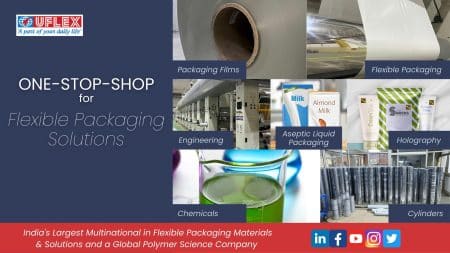Ashok Chaturvedi
In today’s era when the entire world is forever on the go, flexible packaging comes as the real boon for packing food and beverages.
Offering optimised end-to-end packaging solutions for the food and beverage sector is our forte. Over three decades of unrelenting quest for perfection towards the art and science of packaging gives us that natural competitive edge to deliver nothing less than the best to our esteemed customers across the globe. While devising a solution for our clients, we keep an unwavering focus on the following points among others: Aesthetics Barrier Properties; Functionality Ecofriendliness Anti-counterfeiting measures and Cost-effectiveness .
Aesthetics: Today the shopper is deluged with endless options. I choose to term this phenomenon as ‘Supermarket Dilemma.’ It can be quite annoying at times. We always propose superior aesthetics to the brands that we cater to, so that the product stands out in the ocean of products that are competing to grab a share of one’s pocket. Believe me; it’s a war out there! For the very many years of experience in flexible packaging that we have, I am pleased to say that our clients confidently rely on our advice for designing their pack with utmost finesse. We work as partners with them to simulate the ‘Point of Sale’ (POS) experience and reason out all the pros-and-cons to craft out ‘impeccable’ aesthetics that grab the eyeballs. The bio-motive components of flexible packaging such as graphics and imagery trigger positive impact on customers’ subconscious and generate corresponding emotion and action before the conscious part of the brain kicks in. All of this happens in just a few seconds as an inextricable interplay of human psychology and consumer behaviour that ultimately results in sale.
Barrier Properties: What I discuss now is hardcore engineering interspersed with research & development. Clients provide us with detailed specifications like physical properties of the pack (like resistance to tear and punching etc.); shelf life of the product to be packed, susceptibility of the product to moisture and gases; aroma intactness required and so on among others. Basis these parameters, we design the cross-section of the laminate that can offer high barrier or resistance against the non-desirable.
To engineer this, we use high performance plastic substrates/ films that we manufacture in our state-of-the-art facilities. Bearing in mind the desired barrier properties that are required to protect the food and the physical characteristics of the pack, we join various substrates with the help of binding agents called adhesives. We prepare these special adhesives in-house at our chemicals division. Thus you would see that we are a fully integrated end-to-end flexible packaging solution provider for our clients.
Functionality: I cannot emphasise enough how flexible packaging edges above its distant cousins in the rigid packaging segment. Much like the category name ‘flexible’ suggests, this genre of packaging has a whole gamut of possibilities to enhance customers’ convenience and experience. A wide range of opening treatments, fitments, and closures including linear tear characteristics, slit diaphragm membrane, reclosable zippers that do not require any tearing of the pouch header to open, and screw-on spouts for liquid pouches are just some of the functional aspects that flexible packaging brings along with it.
As an end-to-end flexible packaging solution provider we also engineer various types of state-of-the-art form-fill-and seal machines; wrapping machines, printing, laminating and slitting machines to deliver that flawless packaging experience to consumers. We are also making substantive headway towards intelligent packaging that will further ensure protection from contamination and spoilage of food and beverages. Temperature variations in packed food can result in compromising its safety and quality. Driven by rapid advancements in time-temperature indicators (TTI), intelligent packaging is anticipated to witness a strong growth in the coming times. This system could be able to detect food contamination and change of colour in case the food is not fit for consumption by the consumer anymore.
Ecofriendliness: A lot of research by prominent agencies has gone in to prove beyond reasonable doubt that flexible packaging uses less resources and energy than other forms of packaging.
A key trend for flexible plastic packaging is continued down-gauging as the combination of environmental pressures and high polymer prices make customers demand even thinner films. It goes only in the interest of all stakeholders to innovate and come up with high performance yet thinner films that can pave way for light weighting. The trend in food packaging films is towards high-performance film structures that are less permeable to increase shelf life and enhance flavours. Growth is occurring from the transition of items packaged in rigid containers to high quality flexible packages.
Flexible packaging provides significant reduction in costs raw materials used and transport costs besides offering several performance advantages over rigid packaging. Use of flexible packaging can significantly minimise package transport costs between the converter, packer/filler, retailer and end-user. Not only do flexible packs take up less space when empty as compared to rigid containers, but can also be formed on the spot from roll materials at the filling location, thereby economising transportation of ready-formed empty packaging. Post- consumer waste can be reprocessed further contributing to the circular economy.
Thus at all stages, i.e., production, transportation/ handling and disposal flexible packaging involves lesser carbon footprint therefore much less burden on natural resources. Further the mono-plastic film is recyclable and mixed plastic waste can also be reprocessed. We have developed a technology to reprocess the mixed plastic waste, which we have been using for production waste. The company has also been awarded for this technology by international and Indian agencies. With the collective and systemic efforts of all stakeholders, the company can provide solution for reprocessing even post-consumer waste.
In addition to the above, we focus tremendously towards going green. Over the years, we have engineered several ecofriendly substrates like rPET films that contain up to 30% of Post Consumer Waste Re-cyclate Resin; Green PET films where conventional Mono-Ethylene Glycol (MEG) that is made from scarce non-renewable petro-based feedstock has been totally replaced by green MEG sourced from bio-ethanol made from renewable agro inputs. Green PET films are approved for direct food contact by the US Food and Drug Administration (USFDA) and European Union authorities and have the same properties as conventional BOPET films. This is world’s first green polyester product that has won several international awards for sustainability. We have also engineered several variants of Bio and Oxo-degradable BOPP films.
Anti-counterfeiting measures: Technology is both boon and bane. Today with designs being created at a click of a mouse in the West, can be printed real-time in the Far East and vice a versa. It has become more important than ever to protect brands from being counterfeited and duplicated. It is a known fact that product packages that look like the original but containing much inferior product could deal a severe blow to Brand Equity that is earned over the years. We offer Holograms, Holographic Scratch, Holographic Wads, Self Adhesive Labels, Printed Labels to Holographic Paper Labels, Holographic Strips, Holographic Pouches, Holographic Films, HSF Foil, Glitter Film, Sequins Films, Hot Melt Film, Stamping Foils, Fresnel Quality Seal and so on among others to ensure fool-proof security for brands and packs. We continuously innovate for never heard and seen before technology like Unigram/ Latentograms and inks that can only be detected under laser to augment our bouquet of value-added anti-counterfeiting solutions offering unimpeachable protection to brands across the world.
Cost-effectiveness: No prizes for guessing that flexible packaging that paves way for lower energy use at all levels i.e. production, transportation and disposal is certainly cost-effective than its rigid counterpart. The fact that flexible packaging can be considerably reprocessed is further icing on the cake to push the overall costs down. Lighter weight with reduction at source; ease of transportation; convenience of handling of flexible packaging all add to the cost- effectiveness. Coming to think of it, the risk mitigation cost towards value-added features like holography and anti-counterfeiting features that flexible packaging offer to brands and end- users is far lesser than the loss that can arise out of tarnished brand equity with spurious products infesting the market. Thus cost-effectiveness is a natural ally of flexible packaging.
Focussing on the six points that I just discussed, with each passing day, we are honing our understanding and skill sets to attain perfection in the art and science of packaging to the best advantage of our clients.
A strong focus on research and development with the underlying principle of ‘Innovation to Create Differentiation’ has brought the company close enough to become ‘A part of your daily life.’
This article was originally published in FnB News.


